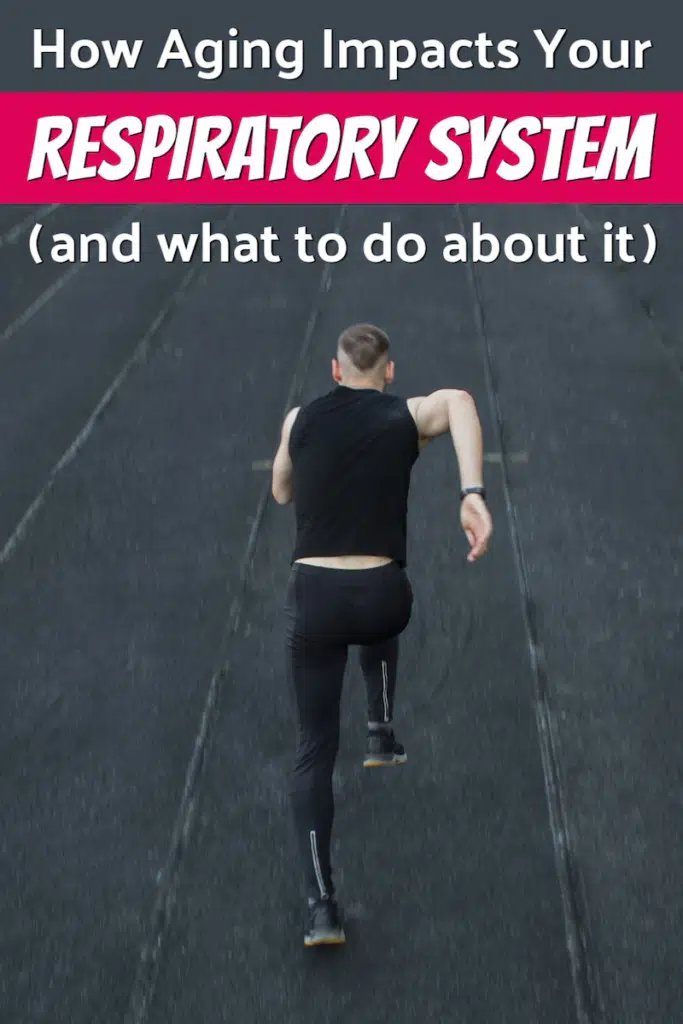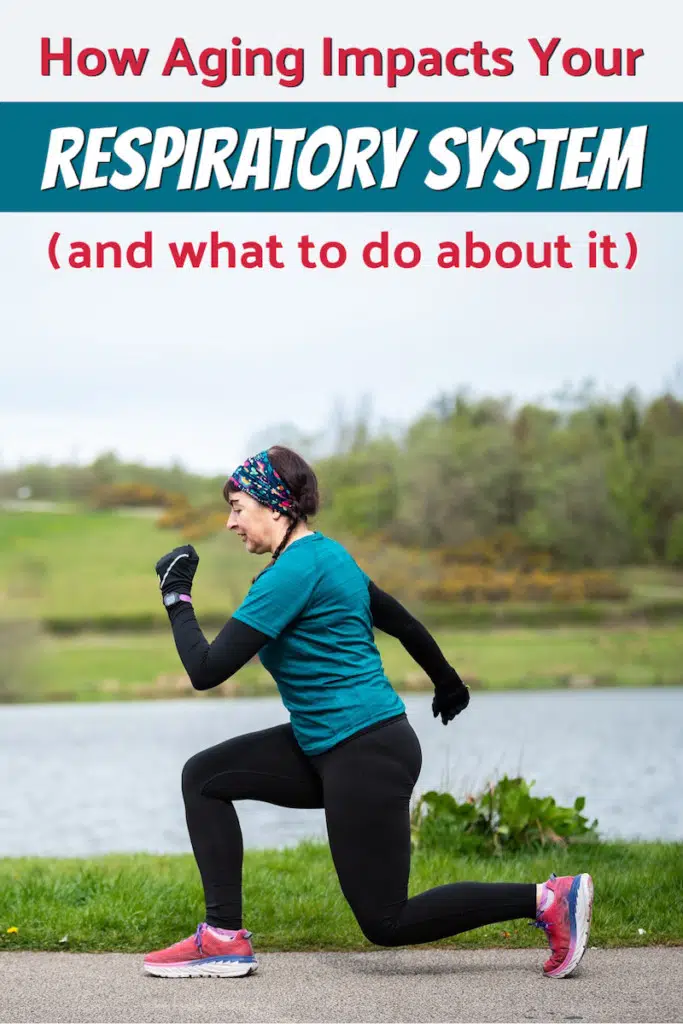Breath is the power behind all things. Your lungs are crucial to your overall well-being, especially as you age. Get healthier lungs! When your respiratory system is strong, you have better odds of living a long and vibrant life.
Here’s how your respiratory system operates and what you can do to ensure it remains in tip-top shape. Breathe easier with these insightful tips.
How the Respiratory Systems Works
Goraksanatha once said, “When the breath is unsteady, all is unsteady; when the breath is still; all is still. Control the breath carefully. Inhalation gives strength and a controlled body; retention gives steadiness of mind and longevity; exhalation purifies body and spirit.”
Delving into the intricate choreography of your respiratory system is akin to unraveling the captivating narrative of a symphony orchestrated by an ensemble of vital players.
Picture this ensemble as a dynamic team, a consortium of organs and tissues collaborating tirelessly to ensure your breathing is a seamless, efficient dance:
1. Airflow Ballet
The Prelude – Inhalation: The odyssey commences as air pirouettes into your nose or mouth. Meet the valiant cilia, the minuscule guardians filtering out dust, while the nasal cavity adds a touch of warmth and humidity to the incoming air.
The Throat’s Crescendo – Pharynx: Down the throat, or pharynx, we go. Tonsils and adenoids stand sentinel, fending off germs like diligent gatekeepers.
The Voicebox Interlude – Larynx: The air waltzes into the larynx, the vocal virtuoso, where cords twirl and vibrate to produce the symphony of your voice.
The Windpipe Rush – Trachea: A brisk descent down the trachea, a bustling tube adorned with cilia and mucus, catches any remaining airborne particles.
2. Gas Exchange Waltz
Bronchial Highways: The trachea splits into bronchial avenues, leading to the lungs. These, in turn, branch into bronchioles, intricate byways guiding air deeper into the lungs.
Alveoli Ballet: The climax unfolds in the alveoli, microscopic maestros of gas exchange. Here, oxygen gracefully waltzes into the bloodstream while carbon dioxide exits the stage.
3. Exhalation Finale
After the grand performance, carbon dioxide-rich air retraces its steps, ascending the bronchioles, bronchi, and trachea. The curtain falls as it exits through your nose or mouth in a final exhalation.
The Team Dynamics
Muscular Maestros: Enter the diaphragm, a powerhouse below your lungs, conducting the breathing symphony. Contracting during inhalation and relaxing during exhalation, it’s the lead dancer. Chest and abdominal muscles join the ensemble, especially during breath-intensive exercise.

Blood’s Melodic Voyage: Oxygen hitchhikes on red blood cells, traversing your body to energize cells, while carbon dioxide returns to the lungs for its grand exit.
Sustaining the Harmony
Mucus Ballet: Enter mucus, the prima ballerina produced by airway linings, capturing dust and germs. The ever-vigilant cilia sweep it upward, a graceful dance where it’s either swallowed or expelled through a cough.
Lymphatic Orchestra: Throughout this respiratory sonnet, lymph nodes, like vigilant sentinels, filter out germs, ensuring infections take no center stage.
In this grand respiratory spectacle, the artistry lies not only in the intricate movements of individual components but in the harmonious synergy that sustains the rhythm of life.
Your respiratory system, a masterpiece in motion, ensures each breath is a celebration of vitality and well-being.
The Impact of Aging on the Respiratory System
As you age, various aspects of your health naturally change, and your respiratory system is no exception.
Aging influences not only our appearance but also the functionality of our respiratory system. Beyond silver hair and wrinkles, the passing years affect our lungs – essential organs that sustain life.
Because lungs are often overlooked, I’m going to delve into the effects of aging on the respiratory system and provide practical ways to keep your lungs healthy as the years progress.
Chronic Obstructive Pulmonary Disease: Understanding and Management
Chronic Obstructive Pulmonary Disease (COPD) is a prevalent respiratory condition characterized by obstructed airflow and breathing difficulties.
It’s crucial to comprehend the nature of COPD and the strategies for managing its symptoms and progression.
Common symptoms of COPD can vary in severity and might include:
- Shortness of Breath: This is often the most noticeable symptom of COPD. Individuals may find it increasingly difficult to catch their breath as the condition progresses, especially during physical activity. Shortness of breath, medically known as dyspnea, is a common symptom that can signify various underlying conditions.
- Chronic Cough: A persistent cough that produces mucus is a hallmark of COPD. The cough might be worse in the morning and can be triggered by irritants in the air.
- Wheezing: Wheezing refers to a high-pitched whistling sound that occurs when breathing due to narrowed airways. It can be more pronounced during exhalation.
- Chest Tightness: People with COPD might experience a sensation of tightness or discomfort in the chest, which can be exacerbated during episodes of breathlessness.
- Excess Mucus Production: COPD can lead to increased mucus production in the airways, leading to coughing and frequent throat clearing.
- Fatigue: Breathing difficulties and the effort required to breathe can lead to fatigue and reduced energy levels, affecting overall quality of life.
- Frequent Respiratory Infections: COPD can weaken the immune system’s ability to defend against infections, increasing susceptibility to respiratory diseases like colds, flu, and pneumonia.
- Limited Exercise Tolerance: Due to impaired lung function, individuals with COPD may find it challenging to engage in physical activities that were once routine.
- Blueness of Lips or Fingernails (Cyanosis): In more severe cases, a bluish discoloration of the lips or fingernails might occur due to reduced oxygen levels in the blood.
One lesser-known aspect of COPD is the potential influence of genetic factors.
While smoking is a primary risk factor for COPD, researchers have discovered that genetics also play a role in determining an individual’s susceptibility to developing the condition.
Genetic variants related to lung function and inflammation can increase the likelihood of developing COPD, even in individuals who have never smoked.
This suggests that some people may be more predisposed to COPD due to their genetic makeup.
Another aspect of COPD that can be controversial is the potential overdiagnosis or misdiagnosis of the condition.
COPD shares symptoms with other respiratory disorders – such as asthma, bronchiectasis, and heart failure.
Some individuals may receive a COPD diagnosis without undergoing comprehensive testing to differentiate between these conditions.

Additionally, the diagnostic criteria for COPD have evolved, and there can be variations in how healthcare professionals interpret and apply these criteria. This can lead to difficulty identifying and categorizing individuals with COPD, especially in its earlier stages.
As you age, your ability to fight off infections diminishes, making you more susceptible to respiratory infections.
Explore the importance of vaccinations, such as flu and pneumonia shots, in safeguarding against pneumonia — a leading cause of death among older adults.
If you or someone you know is experiencing these symptoms, particularly if they are chronic and worsening, I encourage you to seek medical attention. Early diagnosis and appropriate management can help improve the quality of life for individuals with COPD.
Guarding Against Respiratory Infections Through Positive Lifestyle Habits
Your lungs are vital for oxygenating your body and expelling waste gases. The intricate interplay between your respiratory muscles and lungs ensures proper breathing.
Here are some things you can do, including making changes in lifestyle, that might help prevent lung cancer and other respiratory ailments.
Exercise More Consistently
Regular exercise is a key factor in maintaining healthy lungs:
- Working out can enhance lung capacity, improve lung function, and reduce the risk of lung diseases.
- Seek out exercises that specifically target respiratory muscles and promote overall well-being.

Aging leads to a decline in cardiovascular fitness, impacting various aspects of respiratory function. Understand the factors contributing to this decline and explore strategies to counteract these changes, maintaining lung health even as you grow older.
The more knowledge you have about how your body works, the better you can treat it now – and into the future.
It all starts with knowing where your weak spots are and taking the necessary steps to strengthen them. Exercise helps keep you strong physically and mentally, so don’t forget to include it in your daily routine.
If you feel like your lungs aren’t functioning properly or notice they’re taking longer than usual to recover after exercise, schedule an appointment with your doctor immediately. And if you’re unsure what kind of exercises will benefit you most, ask an expert, or refer to the training articles on this site.
A healthy lifestyle extends beyond physical activity, however.
Discover the impact of nutrition, smoking cessation, and avoiding environmental factors like radon exposure on your lung health. These lifestyle interventions can significantly reduce your risk of developing lung cancer and other respiratory issues.
Eat a Healthier Diet
Some people who get lung cancer do not exhibit obvious risk factors.
However, some evidence demonstrates that regular vegetable consumption can prevent lung cancer in both smokers and non-smokers (even so, the benefits of a healthy diet, including a lot of vegetables, are much less than the increased risk of lung cancer due to smoking).
In this video, I share tips on improving your health, appearance, and longevity over the age of 50 by moving through the five stages of permanent change.
By the way, in the video, I discuss how monumental Stage 3 is: preparation. Here’s a tip: to prepare for your new fit and healthier lifestyle, ask yourself, “If I were to get in my own way, how would I do it?” The idea is, if you know consciously – in advance – how you might be tempted to self-sabotage, it makes it easier to avoid the pitfalls.
Say Goodbye to Tobacco Cigarettes
Many people would agree that the best way to reduce lung cancer risk is to stop smoking and avoid inhaling other people’s smoke.
If you’ve been smoking for years, don’t be discouraged. You can still quit and reduce your risk for lung cancer.
If you smoke or suffer from chronic health conditions such as obesity or diabetes, this risk increases further:
- Smoking tobacco cigarettes has been linked with a decreased ability to expand your chest cavity during breathing — so even if you’re in good shape otherwise, smoking can further weaken your ability to breathe deeply and fully.
- Smoking reduces the ability of the lungs to produce mucus (which helps trap germs), while obesity and diabetes cause inflammation in the lungs that make them more vulnerable to infection.
If you’re a smoker, quitting is the best way to reduce your risk of lung cancer. If you quit smoking before cancer develops, your damaged lung tissue will gradually start to repair itself.

No matter your age or how long you’ve smoked, quitting may lower your risk of lung cancer and help you live longer.
If you’d like to quit smoking and need help in doing so, see this article: “How to Quit Tobacco.”
To avoid lung cancer, it’s wise to avoid cigarette smoke, radon, and other cancer-causing agents. A healthy diet helps significantly as well as consistent exercise that strengthens the respiratory system.
Since stress tends to impact health negatively, it can also be beneficial to incorporate deep breathing and mindfulness into your weekly routine.
Conclusion: Nurturing Your Lungs Through the Years
Understanding how your respiratory system functions and how it evolves with age is the first step toward taking control of your lung health.
By knowing the potential challenges and effective strategies, you can make informed decisions to ensure your lungs remain strong and resilient.
Aging is an inevitable journey, but its impact on your respiratory system can be mitigated through mindful choices and proactive measures.
By prioritizing physical activity, adopting a healthy lifestyle, and seeking medical guidance, you can maintain vibrant lung health and enjoy a fulfilling life well into your later years.
Remember, the key is knowledge — empowering you to care for your lungs as they’ve cared for you.
Additional Resources on Respiratory Health:
Tao Porchon-Lynch on Breathwork – https://www.newindianexpress.com/world/2019/apr/15/100-year-old-yoga-instructor-tao-porchon-lynch-keeps-moving-dancing-1964704.htmlRespiratory Tissue in the Aged – https://www.lung.org/blog/your-aging-lungs
Bolstering the Respiratory System – https://examine.com/topics/upper-respiratory-tract-infection-risk/
Lung Cancer Basics – https://www.cancer.org/cancer/lung-cancer/causes-risks-prevention/prevention.html
Physiology of Older Lungs – https://www.nursingtimes.net/roles/older-people-nurses-roles/anatomy-and-physiology-of-ageing-2-the-respiratory-system-2-27-02-2017/
Regarding Pneumonia – https://www.lung.org/lung-health-diseases/lung-disease-lookup/pneumonia/five-facts-you-should-know
How Aging Impacts Blood Flow – https://www.ncbi.nlm.nih.gov/pmc/articles/PMC150384/
The Aging Heart: What Happens – https://www.webmd.com/healthy-aging/what-happens-to-your-heart-as-you-age
As Joints Get Older – https://www.betterhealth.vic.gov.au/health/conditionsandtreatments/ageing-muscles-bones-and-joints
